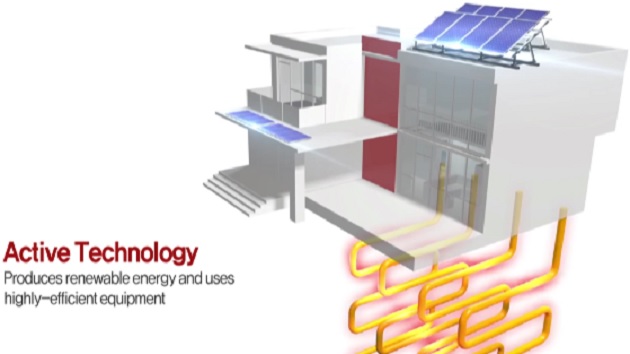
Beginning next year, all new public buildings in Jeju City will be built according to a “Zero Energy System.” They will be highly efficient and they will use renewable sources of power. Mike Balfour reports.
[slug]
Hagye-dong, Seoul
This is an ordinary looking apartment building.
But a closer look reveals triple pane glass windows and window blinds to reduce a heat loss.
Solar panels attached to the outer wall produce electricity.
[slug]
‘Zero Energy Houses’ use renewable energy
Instead of using fuels, the so-called "Zero Energy House" uses renewable energy.
Interview
Jeon Yeon-woo / Zero Energy House owner, Seoul
I heat the rooms only when I have guests. Even if I don’t turn it on, the average temperature is around 20 degrees during the winter.
< 전연우 / 서울시 하계동 >
손님이 오면 (난방을) 틀긴 하는데, 온도를 따로 조절하지 않아도 들어오면 20도 정도를 항상 유지하더라고요.
[slug]
Jeju City to use a 'Zero Energy System' in public buildings
Following the introduction of the Zero Energy System in a few private and public buildings on the mainland, Jeju City is adopting the system for it’s public buildings.
In the early stages of the system, the City will focus on thermal insulation to save energy to heat or cool buildings.
The next step will be energy production from solar and geothermal heat.
[slug]
\20.4b earmarked for ‘Zero Energy’ systems
More than 20 billion won has been earmarked for the project. Designs for 52 structures that will be newly built, expanded or renovated next year include community centers, silver halls and village halls.
Ko Hee-bum / Mayor, Jeju City
This project will reduce costs, save energy, and boost energy efficiency.
< 고희범 / 제주시장 >
비용 절약은 물론이고 에너지 절감, 그리고 에너지의 효율성도 아주 극대화하는 그런 사업입니다.
Jeju City will create a division that deals with the Zero Energy Housing System to expand the system to private buildings. But challenges are foreseeable.
[slug]
Construction is 10-30% more expensive
The construction cost of a Zero Energy House is 10 to 30 percent higher than an ordinary house.
Lee Myeong-ju / Professor, Myongji University
Construction materials are expensive. And there could be a period of trial and error until architects, engineers, and builders becoming familiar with the process. However, investment in human resources could improve the situation.
< 이명주 / 명지대 건축대학 교수 >
자재도 비싸고 좋은 건축사, 기술사, 시공자들의 역량이 만들어질 때까지는 시행착오도 있을 수 있습니다. 하지만 이런 인력 양성까지 같이 병행된다면 상승률은 점차 줄어들 수 있다고 봅니다.
[slug]
Needed: ordinance amendment, funding
Jeju City is planning to subsidize property owners to encourage them to build energy efficient houses. To provide the subsidy, related ordinances need to be amended and budgeting is required.
[Reporter] Mike Balfour
[Camera] Ko Moon-su, Jwa Sang-eun
Jeju City and the Jeju provincial government have not yet had consultations about the proposed Zero Energy project.
Mike Balfour, KCTV





